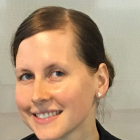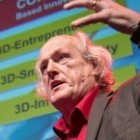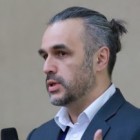Conference Agenda OEB 2018
FD1 Full-day Event
Date Wednesday, Dec 5 Time – RoomKöpenick I/II/III Price: 175.00 € Status: places available
Design Thinking Taster Workshop
Workshop leaders

Anne Guentzel
Design Thinking Coach, Germany
- My profession lies in communication with a focus on team development, politics and marketing - I have gained my work experience in foundation, association, agency and NGO (national and international) - As a program manager I was responsible for the entire communication of a youth participation program
- With the help of Design Thinking Methods and Mindset I design workshops in the fields of Democracy Development, Team Development and Social Entrepreneurship
To see my full Bio please click here: https://www.linkedin.com/in/anne-güntzel-0449a8151
Content
This Pre-Conference Workshop will enable participants to experience the methods and mindsets of design thinking. As collaboration and multidisciplinary team work is one key principle of design thinking, participants will work in teams of five. We will work on the real live challenge “redesigning the learning experience”.
Target audience
Anyone interested in experiencing the methods and mindsets of design thinking
Outcomes
- A clearer idea of what design thinking entails and how it can support the professional activities of the participants
- New ideas on how to approach the topic of learning and loving to learn in general
Agenda
| 08:45 - 09:00 | Arrival |
| 09:00 - 09:30 | Welcome and Short Intro to DT |
| 09:30 - 09:40 | Warm-Up |
| 09:40 - 09:50 | Introduction to the Challenge and Input on Understand |
| 09:50 - 10:20 | Team Check-In and Understand |
| 10:20 - 10:30 | Input on Observation Phase |
| 10:30 - 12:00 | Observe and Fieldwork |
| 12:00 - 13:00 | Lunch |
| 13:00 - 13:10 | Warm-Up |
| 13:10 - 13:25 | Input Synthesis |
| 13:25 - 14:25 | Synthesis |
| 14:25 - 14:35 | Input PoV |
| 14:35 - 15:05 | PoV |
| 15:05 - 15:25 | Coffee-Break |
| 15:25 - 15:35 | Warm Up |
| 15:35 - 15:40 | Input Ideation |
| 15:40 - 16:10 | Ideation |
| 16:10 - 16:15 | Input Prototyping |
| 16:15 - 16:55 | Prototyping Testing |
| 16:55 - 17:05 | Testing |
| 17:05 - 17:10 | Iteration and preperation for presentation |
| 17:10 - 17:40 | Presentation |
| 17:40 - 17:55 | Reflection |
| 17:55 | End |
FD2 Full-day Event
Date Wednesday, Dec 5 Time – RoomBellevue Price: free of charge Status: places available
Speexx Exchange Reality Check

Laura Overton
Managing Director, Towards Maturity, UK
Laura Overton is an experienced international speaker, author and facilitator with a passion for exploring, challenging and sharing.
Founder of Towards Maturity- the expert learning analysts, Laura's focus has always been on bringing a community together to investigate how learning innovation builds business impact, communicating the findings and facilitating change in the industry.
Tracking the L&D learning innovation journey since 2004, she has authored/ co-authored of over 40 major research reports and, as a regular contributor to industry publications she has written over 300 articles.
As an industry change maker, Laura regularly share good practice findings as a keynote presenter at conferences around the globe and through masterclasses, webinars and seminars. She serves on several advisory boards including the CIPD Professional Map and Learning boards and the OEB Global Council.
Laura was the first female recipient of the Learning and Performance Institute’s Colin Corder Award for outstanding achievement and was also the first recipient of the Learning Technology award for outstanding achievement. In 2018, she was voted the Number 1 mover and shaker in the global e-learning listing and in the top 10 EdTech UK influencers.
Links
Please note: this Pre-Conference Workshop is an exclusive event for HR and L&D. You can apply for a day pass via OEB's registration form with your work email address, indicating your organisation and your job title. The organiser will review your application and confirm your participation via email.
Content
Stay tuned for details on this year's Speexx Exchange Reality Check on the state of the e-learning industry.
Target audience
HR and L&D Directors
Outcomes
- Network with senior HR and L&D peers from all over the world and a range of industry backgrounds
- Gain a deep understanding of what the most successful organisations our there are doing in terms of their HR, learning and talent management strategies
- Get practical ideas and best practice tips that can be implemented in the workplace right away
- Witness exclusive research results and case studies that will help you drive performance in your organisation
Agenda
| 09:00 | Breakfast and Registration |
| 10:00 | Welcome |
| 10:15 | Presentations |
| 11:15 | Coffee and Networking |
| 11:30 | Presentations |
| 12:30 | Lunch and Networking |
| 13:30 | Reality Check - Speexx Exchange |
| 13:45 | Presentations |
| 14:45 | Coffee and Networking |
| 15:00 | Reality Check - Speexx Exchange |
| 15:30 | World Café and Crowdsourcing Activity |
| 16:30 | Refreshments and Networking |
How to Easily Create and Use Videos for Teaching and Learning
Pre-Conference Workshop - FD4
FD4 Full-day Event
Date Wednesday, Dec 5 Time – RoomKnight Price: 175.00 € Status: fully booked
How to Easily Create and Use Videos for Teaching and Learning
Workshop leaders

Anja Wipper
E-Learning Leacturer and Consultant, TU Berlin, Zentraleinrichtung Wissenschaftliche Weiterbildung und Kooperation, Germany
Anja Wipper has been working as a trainer and consultant for e- and blended learning at Technische Universität Berlin since 2005. She studied work and instructional psychology and did further studies in university didactics, online learning and video production. As a member of the e-learning team, Anja gives courses and supports lecturers in the use of digital media to facilitate learning and motivate their students. Her specialities are: developing blended learning concepts, designing courses with learning management systems, creating learning videos and using online tools to enhance teaching and learning.
Content
The deployment of audio and video offers various possibilities for enriching your teaching. It can make learning more entertaining and help foster your students’ engagement.
Appropriate audio and video can complement your teaching while reducing the tedium of standard classroom sessions. Furthermore, careful scheduling of the activities can contribute to helping organise the learning process in a way that is more satisfying for both your students and you.
This Pre-Conference Workshop deals with the creation of short learning videos and their possible applications in teaching, with a particular focus on didactic factors.
Join us for an overview of the technical equipment required. You’ll also have the opportunity to practice audio, video and screen recording for various teaching situations, as well as video editing and dissemination of the produced material.
Target audience
Educators with a keen interest in getting started with or improving their skills in the realm of video and audio for classroom use (including, but not limited to e-learning project managers, school teachers, educational technologists, academics, teachers in training, researchers, etc.)
Please bring your own laptop with a preinstalled free test version of Techsmith’s Camtasia software, available for both Windows and macOS, which can be downloaded at https://www.techsmith.com/download/camtasia/. Before installation, please check the system requirements.
Outcomes
- Overview of didactic usage scenarios for learning videos
- Knowledge of technical equipment for recording audio, screen and video
- Producing and implementing small videos in various teaching settings
Agenda
|
09:00 |
Introduction |
|
09:20 |
Learning videos: types, scenarios and production workflow |
|
10:00 |
Voice recording: microphones, tips & tricks |
|
10:30 |
Coffee break |
|
11:00 |
Practice I: Screen recording and voice narration |
|
12:00 |
Video capturing: technical equipment, settings and rules |
|
12:20 |
Practice II: Recording a talking head |
|
13:00 |
Lunch break |
|
14:00 |
Timeline editing, annotations and effects in Camtasia® |
|
14:40 |
Practice III: Post-production: video and sound editing |
|
15:40 |
Cinema time: presenting the workshop results |
M3 Morning Event
Date Wednesday, Dec 5 Time – RoomBishop Price: 95.00 € Status: fully booked
How to Create Innovative Learning Spaces
Workshop leader

Ebba Ossiannilsson
Vice President, Swedish Association for Distance Education and ICDE, Sweden
Prof Dr. Ebba Ossiannilsson, is the V President for the Swedish Association for Distance Education (SADE), and the V President for the Swedish Organization for E-Competence (REK). She is the founder and owner of Ossiannilsson Quality in Open Online Learning (QOOL) Consultancy.
Ossiannilsson is an independent researcher, expert, advisor, consultant and quality reviewer in the fields of open online flexible and distance learning, including el-earning, technology enabled learning (TEL), (OOFAT) including OER and MOOCs. Her special focus is on quality, innovation, leadership, personal learning, and learning "just for me".
She has a long career in those areas, since year 2000, she worked at Lund University, Sweden. In addition, she works as a consultant and quality reviewer at several of the prestige national universities.
Prof Ossiannilsson was awarded the EDEN Fellow title in 2014, she became Open Education Europa Fellow in 2015, and in the Council of EDEN Fellows, from 2018. She became Open Education Europa Fellow in 2015. In 2017 she became ICDE OER Advocacy Committee, Chair and Ambassador, as well as in the ICDE Global Quality Network, Europe.
She is frequently invited as keynote speaker for international, and national conferences, within the areas of OOFAT and quality. She is board member in national and international associations, in the area of open online learning and education (EDEN EC, former EFQUEL, earlier in EUCEN). She was the evaluator of the SEQUENT project on quality, which later become foundation for ENQAs report on quality considerations in e-learning (2018). Ossiannilsson collaborate with the QQI, Irelend, EC ET working group on digital and online learning on quality in OER, MOOCs and open education and with Commonwealth of Learning. She was an expert for IPTS on their work on the framework for open education. Ossiannilsson is a quality reviewer for ICDE as well as for EADTU, ECB Check, and also for former EFQUEL. She Was in the board for LANETO and was among the founders of EPPROBATE. Ossiannilsson was coordinating the ICDE_ON_BOLDIC on behalf of the Swedish Association for Distance Education (SADE). She is in the Board for several scientific Journals and the Editor in the Education Sciences Journal, the topical collection on MOOCs, as well as for the International Journal of Information and Learning Technology, special issue on learning analytic. Ossiannilsson is representing EDEN in ISO, and she works even at national level in SIS/ISO (Swedish Standards Institute /ISO. She has a passion to contribute to open education for a Future We Want for All, as is emphasized by UNESCO for 2030.
Ossiannilsson earned her PhD at Oulu University, Finland in 2012 with a dissertation on Benchmarking e-learning in higher education: lessons learned from international projects. Her dissertation has fortunately had a very large outreach and is often cited. Ossiannilsson’s publications comprise over 200 publications: Conference papers, Journal articles, Book Chapters, Reports, Editor for books, a forthcoming book (Springer on open education) and her dissertation. Ossiannilsson has conducted several research studies in open online learning, including flexible learning, OERs and MOOCs, and personal learning environments. She was the research leader for the ICDE research study on global overview of quality models, and she was the author of the ICDE Insight research report on blended learning, state of the nation. She has conducted several national overview reports, for example, the POERUP, ADOERUP, Global OER Mapping, the IPTS Member States Case Studies on Policies for Opening up Education, and for the Open Education Working Group. She was one of the promoters for introducing MOOCs in Sweden, and she has finalized some 40+ MOOCs herself, since its start in 2008. She was invited as Quality expert for the investigation on MOOCs, and for the initiative on pedagogical development in higher education by the Swedish Higher Education Authority (UKÄ).
Ossiannilsson was a senior consultant at Eurekos/Mentorix, Denmark, and serve as a pedagogical consultant and researcher for the Next Generation Digital Learning Envioronment (NGDLE).
Special Recently Research Projects, and Activities on Quality Work in OOFAT, Including References
The International Council for Open and Distance Education (ICDE)
ICDE OER Advocacy Committee, Chair and Ambassador
ICDE Global Quality Network, Europe
The ICDE research study on Quality Models in Online, Open Education Around the Globe: State of the art and recommendations. The study was on behalf of ICDE and Coordinated by EADTU. Ossiannilsson was the research leader for the study team comprised of K Williams, A Camilleri and M Brown
Ossiannilsson, E. (2017). ICDE Insight research report on blended learning. State of the nation. Oslo: ICDE.
Quality Reviewer on Behalf of ICDE for University Terbuka, Indonesia
ICDE_Operational Network BOLDIC, coordinator
The European Distance E-learning Network
EC, and NAP member and Chair Special Interest Group on Quality and Technology Enabled Learning
ISO representing EDEN
The European Association for Distance Teaching Universities
Evaluator for the Project Supporting Quality in E-learning European Networks (SEQUENT
Quality Reviewer EADTU, Excellence, University of Nicosia
Quality reviewer, EADTU, OpenupEd, University Derby
Member of the Ed board for update of the Excellence manual
Member of the Ed board for updating the OpenupEd manual
Others
Expert, evaluator European Commission
Quality Reviewer EFQUEL, UNIQUe (University of Nicosia)
Quality Reviewer EFQUEL, ECB Check
European Commission ET Working Group on Open and Distance Learning
IPTS Working Group on Open Education Framework, Focus on Quality
Commonwealth of Learning
IPTS Member States Case Studies on Policies for Opening Up Education (2016--)
EUA on Comments for the Directive of the European parliament and of the council on copyright in the Digital Single Market
QQI, Quality reviewer
Follow Ossiannilsson on ResearchGate, Linked In, Blog and Twitter.
Links
Content
"If you can design the physical space, the social space, and the information space all together to enhance collaborative learning, then that whole milieu turns into a learning technology, and people just love working there, and they start learning with and from each other." John Seely Brown
We are standing on the brink of a technological revolution that will fundamentally alter the way we live, work, and relate to one another. In its scale, scope, and complexity, the transformation will be unlike anything humankind has experienced. We do not yet know just how it will unfold, but one thing is clear: the response to it must be integrated and comprehensive, involving all stakeholders of the global polity, from the public and private sectors to academia and civil society.
In this era of the “fourth industrial revolution”, as we strive to implement UNESCO’s Sustainable Development Goals for Education 2030 (access, inclusiveness, lifelong learning, equity, equality, quality and democracy), there is an urgent need to rethink and optimise learning spaces for all.
To be proactive, and to cope with the fourth industrial revolution and learners of today, educators need to make learning spaces work for everyone.
Active, authentic learning requires innovative learning spaces, and we need strategies to embrace these extended learning spaces for active learning.
Innovative learning spaces require innovative leadership and management to be realised and become embedded, embraced and sustainable.
Space, whether physical or virtual, has an impact on learning. It not only brings people together – it can encourage and facilitate exploration, collaboration, and discussion. Space may include, for example, living space, physical space, social space, or intellective space. Space has to be considered both for informal and formal learning as these merge and lines between them blur.
During this Pre-Conference Workshop, we will discuss characteristics of innovative learning spaces, the impact of innovative learning spaces on student motivation and outcomes, as well as leadership.
Target audience
HR specialists, learning and design directors, academics, managers and leaders at all levels, librarians, architects, infrastructure designers, influencers
Outcomes
The Workshop will engage you in the emerging theme of innovative learning spaces in a digital era. It is designed for active participation and collaboration and will be facilitated in a learning café format to ensure we can all share and exchange best practice for innovative learning spaces. You will have a chance to explore key areas and characteristics of innovative learning spaces with peers. In addition, under the guidance of the Workshop’s expert facilitator, we will elaborate on leadership characteristics and stakeholder involvement in order to cultivate a culture of innovative qualitative learning spaces.
In short, we will focus on how we can create and cultivate a true culture of innovative learning spaces at the micro, meso, and macro levels.
Agenda
| 09:00 | Welcome, and Icebreaking session |
| 09:20 | Introduction, and keynote |
| 10:00 | Coffee break and networking mingle |
| 10:45 | Workshop, best/next practise |
| 12:30 | Wrapping up, conclusions, and recommendations |
Pragmatic Learning Magic: How to Use the Instructional Design Variation Matrix
Pre-Conference Workshop - M5
M5 Morning Event
Date Wednesday, Dec 5 Time – RoomChess Price: 95.00 € Status: fully booked
Pragmatic Learning Magic: How to Use the Instructional Design Variation Matrix
Workshop leader

Inge de Waard
Strategic Instructional Designer, InnoEnergy and Open University, UK, Belgium
Inge de Waard (PhD) is currently leading the learning part of an InnoEnergy project that alleviates skill and competency gaps by combining machine learning, artificial intelligence (AI), learning analytics and learning design. This project combines the expertise of people working for InnoEnergy, The Open University (UK), FutureLearn and many European University partners working on renewable energy.
Since 1999, she has set-up, coordinated and developed several online, blended and mobile learning projects, always with a focus on participation and durability. These projects involved partners and individuals from both the Northern (Canada, United States, Italy, Belgium, Ireland, Germany, UK) and Southern regions (South-Africa, India, Peru, Morocco). As an avid enthusiast of open science, she is an active international speaker giving keynotes and guest lectures, as well as providing and receiving knowledge input through seminars, SIGs and workshops.
Enlightened by the first connectivist MOOCs, she set up the first MOOC on mobile learning, called MobiMOOC (2011 & 2012). This was a community and project-oriented MOOC, enabling international learners to realize their own project by the end of the MOOC.
Her core sentiment on learning is: “I have come to realize that there is no single solution for all. The diversity which is at the core of nature’s success, is replicated by the diversity in learning preferences and ways to achieve learning success in humans”. She loves to exchange ideas, so feel free to talk to her.
Links
Content
As instructional designers and online educators, we love learning. However, our workloads are increasing, and as human beings, we may have our training/instructional preferences. These two realities make it difficult to consider the diverse variety of options available that are relevant to learning needs in specific circumstances.
Bring your ID challenge to this workshop, and we will collaboratively find a fitting solution using the Instructional Variation Matrix (IDV matrix), written by Inge de Waard.
This Pre-Conference Workshop takes what you already use/do in your trainings or classes and will help you zoom in on specific elements for improvement to lift your learners to the next level. The IDV matrix uses opposing learning parameters to map out instructional design options for a variety of learning environments and actions. Among them are
- individual versus social learning
- formal versus informal learning
- cheap versus expensive ID solutions
- standardised learning versus contextualized learning
The IDV matrix lists single tools, but also includes more complex combinations, e.g. escape box, 360 degrees learning, teacherbots.
The Workshop will be structured so that you can learn from each other and offer solutions. You will examine and broaden your existing mode of instruction with your specific target group and course goals in mind. Join and discover learning alternatives to add to your existing knowledge, and - best of all - start implementing what is of immediate use!
Target audience
We expect the participants will include instructional designers; educators giving online, blended courses; trainers designing on-the-workfloor or in-the-field courses, and other professionals from related fields. An intermediate level of expertise is recommended.
Outcomes
The Workshop will provide you with an overview of what the Instuctional Design Variation Matrix is and what it can do.
You will use it and find out more about the type of learning you are currently using/applying/undertaking (and unconsciously repeating). You will take home a template to (re)develop your courses and/or trainings.
The IDV matrix offers insights into different types of instructional and learning design and can also have a positive impact on the evolution and deployment of blended or online learning approaches. It has been developed by an e-learning expert with 15+ years of experience in a wide variety of online and blended-learning settings on the international level, including mobile learning, MOOCs, e-learning, and SPOCs.
M6 Morning Event
Date Wednesday, Dec 5 Time – RoomCharlottenburg II Price: free of charge Status: fully booked
Summit: Cultivating Lifelong Learners
Workshop leader

Myron Cizdyn
President, eLearning Journeys, Poland
Myron Cizdyn is Founder of the eLearning Journeys Initiative, which seeks to advance eLearning in Europe and beyond; energize institutional, educational and business thought leaders to support and promote eLearning; and project standards-based educational values throughout all segments of society. The goal of eLJ is to implement programs in instructional design to encourage entrepreneurial initiatives in tool and curriculum development; and to explore the benefits of standards-based learning in all segments.
eLearning Journeys holds a conference in Rzeszow once a year in the autumn, as well as continuing initiatives throughout Poland and beyond with its educational and industry partnerships.
He is also the President of The BLPS Group, which created the Gateway2Achieve learning platform, and has 27 years of experience in religious and educational publishing in the USA, Vatican, and Europe. He also serves on the Board of Directors of the SIIA's Educational Technology Industry Network.
Links
Content
Everyone believes in lifelong learning. But what does this mean in the real world? How do learning standards translate into a lifelong process and not into a mere list of granular skills to achieve for a specific goal? We feel that Lifelong Learning Standards are a great starting point to discuss how to cultivate lifelong learners by fostering intrinsic motivation, making change the constant, and making learning part of a community. This community includes a great variety of mentors, teachers, and content generators working with learners... and being learners themselves.
Imagine taking half a day and discussing lifelong learning without once discussing a grade-specific or job-specific skill or competency. Imagine discussing subjects that pertain to every learner, at every stage of life, education, and socioeconomic situation. Now, imagine attending such a workshop with decision-makers and specialists from across the learning spectrum: instructional designers, training leaders, teachers, administrators... in a small group setting and with a highly interactive format.
This Pre-Conference workshop begins with a general introduction and then divides into eight small groups. Each group is led by a facilitator expert in the traits of lifelong learning, and each group discusses four of the following eight lifelong learning standards:
- Possess core knowledge on which to build future learning
- Set and carry out personal learning goals
- Acquire, analyse, organise, and evaluate information from a variety of sources
- Persevere in difficult situations
- Demonstrate the habits of continuous improvement
- Self-assess progress, evaluates actions, and adjust as needed
- Engage in tasks even when answers or solutions are not immediately apparent
- View situations outside the boundaries of standard conventions
Each group will discuss what these skills mean in their school, their workplace, and their environments. Facilitators will come from school, higher education, medical & wellness, business, corporate training, educational technology, and content providers. The goal is to find the common threads that can be applied at all stages and in all phases, to cultivate learners in a holistic way and to work together to generate not just better test results, but a more informed, ethical, and productive society.
At the end of the Workshop, everyone will reassemble for a review of lessons learned and a discussion of next steps and how we will apply them in our lives. Lifelong learning requires that we view ourselves not just as leaders, but as learners. Register for our workshop and eliminate the distinction between learner and leader.
Target audience
- Ministries & Government
- NGOs
- Administrators
- Practitioners
- Content Providers
- Employers & HR
- Startups & Innovation
- Technology & Hardware Providers
Outcomes
A deeper understanding of the commonalities of learning, so all participants can begin to develop best practices that can be applied to learners in all segments. A white paper will be generated after the conference based on the Workshop.
Agenda
| 08:30 | Gathering and Introductions |
| 09:15 | Discussion 1 |
| 09:35 | Discussion 2 |
| 09:55 | Coffee Break |
| 10:40 | Discussion 3 |
| 11:00 | Discussion 4 |
| 11:20 | Interactive Discussions of Lessons Learned among the Facilitators |
| 12:00 | Q&A |
M4 Morning Event
Date Wednesday, Dec 5 Time – RoomCheck Price: free of charge Status: fully booked
Learning Works – The Future of Workplace Learning
Workshop leaders

Guenter Podlacha
Head of Section, E-Academy, GIZ - Academy for International Cooperation, Germany
My name is Guenter Podlacha, and I am heading the divison Global Knowledge Sharing & Learning at Academy for International Cooperation (AIZ) of GIZ GmbH - German Development Cooperation.
17 years ago - then in stoneage of the Web - I started with online information systems, virtual communication & networking, e-learning, and e-coaching.
My special interests are [e-]learning methodology and management, and the interface wo/men and ICT, where I am often mediating between users and ICT systems, and especially the Internet.
In my first life I was exploring the nature, working as ranger and scientist in natural resource management - that's still more than a hobby.
Links

Philipp Busch
GIZ - Academy for International Cooperation, Germany
My name is Philipp Busch and I am a Project Manager working at GIZ's divison Global Knowledge Sharing & Learning at Academy for International Cooperation (AIZ) - German Development Cooperation in Bonn. My work comprises different areas, mainly in the field of E-Learning and Gamification, in which i am writing my phD in Germany. My Master Thesis dealt with the subject of E-Learning and Change Management.
Apart from work i love traveling and sailing..
Links

Anja C. Wagner
Konzeption & Beratung, FrolleinFlow - Institute for creative flaneurs, Germany
Dr. Anja C. Wagner deals with global transformation in the digital age.
In the last two decades, she managed numerous digital education projects for (big) companies, universities, NGOs and independent initiatives. There are also ten years of teaching and research in universities. She is considered a creative trendsetter and describes herself as an educational transformer. Her purpose is, to empower individuals, institutions and regions to connect to modern, networked learning environments.
As an expert at the interface between globally linked work and digital education, she focusses on the topics of user experience, education policy, workflow management and our future in a networked society. To this end, she likes to rely on her growing (online) network to develop new formats, online courses, e-books and community networks as well as practicing Citizen Science.
Today, she offers studies, lectures, consulting and various online projects under the umbrella of FrolleinFlow GbR. FLOWCAMPUS is one of those online projects. It's an innovative network of creative people, bringing together the needs of small and medium companies with the networking skills of the creative class.
Further informations: http://acwagner.info and https://frolleinflow.com/english/
Links

Tom Wambeke
Learning Specialist, International Training Centre of the International Labour Organisation (ITC-ILO), Italy
Tom Wambeke, Belgium, is graduated in Educational Sciences and holds a Master in Cultural Management and recently finished an Executive Business LEAD degree in Innovation at Stanford University.
Before joining the International Training Centre of the ILO he was assistant Professor at the University of Leuven and innovation coach at Open Higher Education.
He is currently Programme Manager of DELTA which specializes in providing sustainable learning solutions with the objective to generate impact and organizational change.
The unit he is leading has a double mandate: to strengthen the Centre’s in-house capacity to apply state-of-the art learning and knowledge sharing methods and technology, and to provide (e)-learning services to outside partners on a global scale. In this context he works closely together with UN agencies, development banks, international organisations, governments and NGO’s.
As a certified international facilitator (IAF) he’s actively involved in strategy facilitation, participatory knowledge sharing, networked learning and ICT4Development. This he combines with a passion for complexity adaptive thinking, foresight analysis and futures exploration.
Links

Thomas Tillmann
Founder, ABC Tillmann - Consulting in Education, Germany
- Business consultant specialized in Corporate Learning
-
Developing innovative learning strategies for leading international companies / organizations, e.g.:
- How to link Corporate Learning closely to Corporate Strategy?
- How can agile learning support agile work?
- How to prepare employees as well as organizations for a more self-directed, autonomous model of learning?
- How to integrate learning routines into daily work?
- How to transform the learning culture of an organization?
- How to leverage the potential of digitization in learning?
- ...
Links
Content
Learning is changing rapidly, and workplace learning and training are as well. How can we come to terms with this change practically and concretely? Can we use agile methodologies to create better results, faster - in support of new workplace learning? What are useful strategies in order to avoid making wrong investments? What is the future of methods such as gamification? What is the impact of new forms of working?
We believe these and many other related questions can only be answered by sharing our knowledge and experiences.
This Pre-Conference Workshop (co-organised by GIZ’s Academy for International Cooperation and the International Training Centre of the ILO) will be facilitated as a bar camp in an open-space format and will focus on concrete practices und proven cases brought in by a team of expert facilitators and by you, the participants.
Target audience
Everyone interested in sharing their thinking and practice vis-à-vis new workplace learning in formal and non-formal learning settings from the workplace-learning sector, education institutions, the policy sector, and governmental organisations
Outcomes
Take-aways include personalised learning bricks, enriched insights into the manifoldness of workplace learning, as well as ideas on how to challenge workplace learning in an open and non-formal manner!
M1 Morning Event
Date Wednesday, Dec 5 Time – RoomTegel Price: 95.00 € Status: fully booked
Playful Design: the 360 VR Learning Experience
Workshop leaders
Content
We all know that our students can learn a lot from books, lectures and online content, but an unquestionable gap exists between theory and practice and between passively gained knowledge and affective experiences. We believe that VR can play a vital role in closing this gap. To this effect, we are currently implementing eight VR learning experiences as part of a pilot programme that will run during the 2018-2019 academic year. These learning experiences will be organised in several faculties at Leiden University such as Archaeology, Natural Sciences, and the University Medical Center, and will serve approximately 1500 students.
In this Pre-Conference Workshop, we will dive into how we co-create our learning experiences. What makes a 360 VR experience suitable for university students? How do you design a learning experience that caters to every learner’s level of knowledge? We will detail our way of working, from identifying key areas for educational VR with professors and students, to our famous 'pressure cooker' learning experience design sessions.
There is a key difference when designing an experience for education compared to other fields that lies in the huge responsibility we have towards our students. How do you make sure that you adhere to sound pedagogical concepts and academic standards? We will detail how we can be sure to stay ahead of the curve in terms of innovation, while maintaining a robust pedagogical foundation.
And what about the results? Do the experiences work? In the last part, we will talk about how we evaluate our learning experiences. Piloting, beta testing and, of course, different in-app analytics (such as eye tracking) are an integral part of our evaluation process. The goal of this Pre-Conference Workshop is to learn from concrete examples of the implementation of 360 VR into the core curriculum of a university and to explore together how this would work for your organisation.
Target audience
Instructional designers, policy makers, teachers, consultants, media professionals, project managers, students, and anyone interested in VR and ist educational potential
Outcomes
The audience will learn about the didactics and technology involved in the creation of academic 360 VR content. Their main takeaways will be
- Why would you use 360 VR in education?
- How can you implement 360 VR in (university) education?
- What kind of results can be expected?
- What are the potential pitfalls of such a complex project?
- How do you maintain a sufficiently didactic approach when implementing 360 VR in education?
Agenda
| 09:30 | Introduction |
| 09:40 |
Presentation of core concept
|
| 10:20 | Work session 1: Who is your learner |
| 11:00 | Coffee Break |
| 11:45 | Work session 2: Mapping the learning experience |
| 12:45 | Rounding up: presenting the results of our pilots / Q&A |
Moodle Workshops: Designing Courses for Mobile Learning & Using Competencies in Your Courses
Pre-Conference Workshop - M2
M2 Morning Event
Date Wednesday, Dec 5 Time – RoomCharlottenburg I Price: free of charge Status: places available
Moodle Workshops: Designing Courses for Mobile Learning & Using Competencies in Your Courses
Workshop leader
Content
This workshop covers two areas of learning using Moodle. The first section explodes the key aspects when designing Mobile Learning, and the second looks at the practical aspects of using competencies to help tracking teaching and learning in your courses.
Target audience
This is open to anyone interested in how to engage learners through competencies as well as connect with learners through mobile devices
Outcomes
- Be able to create a mobile friendly course
- Be able to implement competency frameworks for tracking learners
Agenda
| 09:30 | Overview of Moodle |
| 09:50 | Designing courses for Mobile Learning |
| 10:50 | Coffee Break |
| 11:30 | Using Competencies to Track Learners |
| 12:30 | Q&A |
Boosting the Use of Online Training by Small Companies in Europe
Pre-Conference Workshop - FD3
FD3 Full-day Event
Date Wednesday, Dec 5 Time – RoomSchöneberg Price: free of charge Status: fully booked
Boosting the Use of Online Training by Small Companies in Europe
Workshop leaders

Kristina Dervojeda
Senior Manager, PriceWaterhouseCoopers, The Netherlands
Dr. Kristina Dervojeda leads PwC Innovation Research Centre of PwC Netherlands. She specialises in policy research in the field of emerging technologies, with a particular focus on skills and new/alternative forms of education and training. Specific topics of interest include Key Enabling Technologies and skills-related issues for high-tech occupations. Kristina has an extensive track record of working on multi-country assignments for the European Commission in a role of Project Manager and Senior Expert. Kristina holds a PhD degree in Innovation Management at the University of Twente.
Links
Speakers

Nikitas Kastis
Researcher and Educational Policy Analyst, Mind2Innovate, Greece
Nikitas Kastis has a First Honours Degree in Engineering and a Ph.D. in Financial Management and Evaluation, with the National Technical University of Athens (NTUA).
He has been Research Associate at the NTUA, Assistant Professor at the Technical University of Crete and Visiting Professor for Production Management & Decision Making at the Greek Air Force Academy. In 1992 he joined Lambrakis (Research) Foundation to lead its innovation programmes and actions, dealing with implementation and impact assessment and related to the evolution of the ICT-based applications in education and culture as well as with their validation for learning and for human capacity building.
He has managed a significant number of national and European research and innovation projects and studies, for the quality upgrade in school and post-secondary education and training, formal and informal as well as adults learning. Since 1999 and till 2016, he had served as the President of the BoD of the MENON Network, a European body (EEIG) contributing as a European learning and innovation think-tank.
Since 2016 he has founded an education & social policy consulting company, named Mind2Innovate, which is taking stock on the research and analysis legacy of the European MENON Network, continuing the policy and programme consulting work and supporting evidence-based policy making for education and other sectors of social-affairs policy making. He has also served, since 2016, as Chief Advisor to the University of Athens Distance Education Centre, the eLearning/Online Learning Programme. Dr N. Kastis had been a Member of the Executive Committee of EDEN and he is an EDEN Research Fellow. He had also been the Chair of its “Open Classroom” Working Group, from 2000 to 2008.
He has been and is currently participating to a number of education policy-making studies and learning innovation projects for the European Commission, national and international stakeholders.
Links

Christian Friedl
Graz University of Applied Sciences, Austria
Christian is Senior Lecturer at the Institute of International Management at FH JOANNEUM - University of Applied Sciences in Graz, Austria teaching entrepreneurship and project management. His research focuses on (corporate) entrepreneurship, edupreneurship, and university-business corporation. He is operational project leader of the Global Entrepreneurship Monitor Austria, the coordinator of several EU-wide and international research projects (e.g. BizMOOC – Knowledge Alliance on MOOCs), and developer of/facilitator in business MOOCs (e.g. on Intrapreneurship or Competences for Global Collaboration).
Christian holds a Master´s degree in Business Administration and Environmental System Sciences, a Postgraduate Master´s degree in European Project and Public Management and he is Graduated Adult Educator (wba austria). Currently, he is doing his PhD in the field of corporate entrepreneurship education at the University of Graz. Besides academia, he was working in music industries for 14 years.

Märt Aro
DreamApply, Estonia
Since 2004 Märt has co-founded 3 NGO’s and 4 companies in education development.
Märt is passionate about internationalization of education, as he believes that studying abroad is very important for one’s self-development.
Business wise Märt is currently dedicated on DreamApply.com Student Admission Platform that he co-founded in 2011. www.DreamApply.com is used by more than 200 universities from across 30 countries. By now the platform has served over 600 000 students’ applications to full degree studies, student exchange and scholarship programmes.
In 2016 Märt established the Nordic EdTech Forum www.NordicEdTechForum.org which brings together founders of education innovation organisations and companies from across 8 Northern European countries with the aim of improving learning experience to everybody, globally.
He also enjoys doing education development and internationalisation consultations/trainings on university and national level.
Märt also is a proud father of two lovely sons Aston (11) and Hasse Kristjan (9).
Content
For most small and medium-sized enterprises (SMEs), and particularly for SMEs active in high-tech domains, it is highly difficult to find, attract and retain highly skilled individuals. SMEs cannot afford significant training costs requiring long periods of absence of their staff. At the same time, upskilling and reskilling are of key importance for them, as rapid technological developments quickly make existing knowledge and skills obsolete. SMEs could use online training as a more cost-effective, flexible and accessible way to educate their staff. However, the adoption of online training by European SMEs is occurring at a slow pace.
To this end, the Executive Agency for Small and Medium-sized Enterprises (EASME) and the Directorate General for Internal Market, Industry, Entrepreneurship and SMEs (DG GROW) of the European Commission have recently launched a new initiative on “Promoting Online Training Opportunities for the Workforce in Europe”.
This initiative strives to explore the role of online training in tackling the skills-related challenges in Europe, with a particular focus on high-tech SMEs. It implies performing an extensive state-of-play analysis, developing a common vision and formulating recommendations for supporting measures. Examples of the key issues that are addressed by this initiative include
- What exactly needs to be done and by whom to stimulate the uptake of online training by SMEs in Europe?
- How should the funding of online training-related initiatives for the workforce be organised?
- How can online training best complement other (more traditional) forms of training?
- What are the most promising ways of reaching out to the workforce (particularly within SMEs) to engage them in online training?
Online training here refers to a wide range of digital learning solutions, including bespoke and off-the-shelf e-learning, video content, mobile learning, MOOCs, virtual reality, gamification, etc. The outcome of this initiative will play a prominent role in forming future EU policymaking in regard to online training.
The current expert Pre-Conference Workshop will discuss detailed proposals for support measures to stimulate the uptake of online training by SMEs in Europe. The Workshop will feature good-practice examples and practical illustrations of the proposed solutions. Furthermore, it will provide a platform for discussion, with an opportunity for participants to provide facts, figures, testimonies and solutions.
Target Audience
Hands-on practitioners and industry professionals, including course developers, publishers, and vendors, as well as facilitators and policy makers with a shared interest in technology-enhanced learning.
Outcomes
Specifically, your contribution will help us further develop a blueprint for the common vision for EU policymaking in the field of online training for SMEs. This common vision will include specific measures, roles and priorities at the EU and national levels for implementation towards 2022 and beyond.
Agenda
| 10:00 | Welcome and introduction |
| 10:30 | SMEs and online training: a match made in heaven? |
| 11:00 | The good, the bad and the ugly truth about innovation in lifelong learning: towards an ecosystem approach |
| 11:30 | Discussion and participants’ feedback |
| 12:00 | Lunch |
| 13:00 | Towards specific measures for promoting online training among European SMEs |
| 15:00 | Discussion and participants’ feedback |
| 15:30 | Wrapping up: concluding remarks |
A ‘Whistle-Stop’ Tour around Carpe Diem Methods - Learning Design for the Future
Pre-Conference Workshop - A2
A2 Afternoon Event
Date Wednesday, Dec 5 Time – RoomCharlottenburg III Price: 95.00 € Status: places available
A ‘Whistle-Stop’ Tour around Carpe Diem Methods - Learning Design for the Future
Workshop leader

Gilly Salmon
Academic Director, Online Education Services, UK
Professor Gilly Salmon has been a learning innovator for more than 30 years and is one of the world’s leading thinkers in digital and blended learning.
She researches and publishes widely on the themes of innovation and change in Higher Education and the exploitation of new technologies of all kinds in the service of learning.
She is internationally renowned for her significant contributions to education futures, including research, innovation, programme design, teaching methods and the use of new technologies. She recently joined Online Education Services (OES) in the UK.
Previously, she was at the University of Liverpool Management School, Pro Vice-Chancellor of Education Innovation at the University of Western Australia, Pro Vice-Chancellor of Learning Transformations at Swinburne University of Technology, Melbourne, Australia; Previously she was Professor of E-learning and Learning Technologies, and Head of the Beyond Distance Research Alliance and the Media Zoo, at the University of Leicester in the UK, and prior to that with the UK Open University Business School.
See her web site www.gillysalmon.com
Links
Content
Get on the track to undertake a fast journey around visualising future graduates, threshold concepts, authentic assessment, story-boarding for engagement, transformation, change and achievement through learning design.
Target audience
All types of staff from any discipline involved in transformation, change or designing learning or creating the future. Come as an individual or as a team. Requirements: some understanding of online or blended pedagogy and or technology.
Outcomes
Take away - understanding of techniques and how to put them together for learning design for the future and the capability and capacity to do it for real!
Agenda
| 14:30 - 15:00 | Intros - to each other & to Programme Carpe Diem design |
| 15:00 - 15:45 | Rich diagrams - graduates of the future |
| 15:45 - 16:15 | Working break – Authentic assessment (AA) & threshold concepts (TC) |
| 16:15 - 16:30 | Planning for AA & TC |
| 16:30 - 17:30 | Shaping the future story board & peer feedback |
| 17:30 - 18:00 | Engaging the audience & visualing take aways |
| 18:00 | First step to achieving the future and finish |
capacity to do it for real!
Aktives Lernen gestalten und fördern – Welches Potenzial bieten digitale Medien?
Pre-Conference Workshop - A5
A5 Afternoon Event
Date Wednesday, Dec 5 Time – RoomCheck Price: free of charge Status: places available
Aktives Lernen gestalten und fördern – Welches Potenzial bieten digitale Medien?
Workshop leader

Isabel García-Wülfing
Senior Researcher, Bundesinstitut für Berufsbildung, Germany
Isabel García-Wülfing ist wissenschaftliche Mitarbeiterin im Bundesinstitut für Berufsbildung und seit Anfang 2011 zuständig für die fachliche Begleitung des Förderprogramms des Bundesministeriums für Bildung und Forschung zur Entwicklung und zum Einsatz digitaler Medien in der beruflichen Bildung.
Links
Speakers

Martin Lemos
Audiovisual Media Center Medical Faculty RWTH Aachen, RWTH Aachen University, Germany
Martin Lemos is a digital media and didactic designer and educational researcher. He has a background in media design and specialized later in eLearning and didactics. For the last ten years, he has been working in the Audiovisual Media Center at the Faculty of Medicine, RWTH Aachen University in Germany. He and his team have developed various learning applications as well as blended learning concepts and modules for different educational programs: medical, dental and physiotherapy higher education. Martin designs and teaches multimedia, e-learning and media production courses at different universities for undergraduate students and offers workshops for the postgraduate medical education, both in English and German. He has attended several national and international educational conferences as an invited speaker. His current research interests are serious games, mobile learning and XR in medical education.
Links

Bernd Mahrin
Wissenschaftlicher Mitarbeiter, Technische Universität Berlin, Germany
Bernd Mahrin ist Maschinenbau-Ingenieur und Berufspädagoge. Nach Tätigkeiten als Konstrukteur und Fertigungsingenieur arbeitet er für die gewerblich-technische Berufsbildung in wechselnden Funktionen, Bereichen, Praxis- und Forschungsprojekten im In- und Ausland für verschiedene Universitäten, Institutionen der Wirtschaft und freie Träger.
Zurzeit unterstützt er als wissenschaftlicher Mitarbeiter am Institut für Berufliche Bildung und Arbeitslehre der Technischen Universität Berlin zwei Projekte aus der Förderlinie „Digitale Medien in der beruflichen Bildung“ des Bundesministeriums für Bildung und Forschung (BMBF) konzeptionell, didaktisch, methodisch und durch formative Evaluation. Seine Arbeitsschwerpunkte sind digitale Medien in der technischen Berufsbildung, Kooperation und Netzwerkbildung, Berufsbildung im internationalen Kontext, Fachdidaktiken Bautechnik, Metall- und Elektrotechnik und Benachteiligtenförderung in der Berufsbildung.
Zugleich ist er im Auftrag des Bundesinstituts für Berufsbildung (BIBB) und des Bundesamtes für Wirtschaft und Ausfuhrkontrolle (BAFA) tätig als Gutachter für überbetriebliche Berufsbildungsstätten und Kompetenzzentren und moderiert das bundesweite Kompetenznetzwerk Bau und Energie e.V., einen Zusammenschluss anerkannter Kompetenzzentren der beruflichen Bildung.
Links

Marko Jovanovic
RWTH Aachen, Germany
Marko Jovanović acquired his engineering degree in Computer Engineering and Computer Science at the University of Belgrade, School of Electrical Engineering (Belgrade, Serbia) in 2010. He acquired a Master's degree in Computer Science with a minor in Business Administration from RWTH Aachen University (Aachen, Germany) in 2016. Subsequently, he joined the mHealth Division at the Department of Medical Informatics, Uniklinik RWTH Aachen (Aachen, Germany) where he is researching solutions for wearable-supported automated error detection and feedback giving in physiotherapy training. His research interests include mobile health, wearable technologies, e-learning and medical image processing.
Content
Die Digitalisierung der Arbeitswelt schreitet schnell voran und hat Auswirkungen auf die berufliche Aus- und Weiterbildung. Neue Formen der Gestaltung von Lernen und Lehren sind gefragt. Der Einsatz digitaler Medien bietet vielfältige Möglichkeiten, um Lehr- und Lernangebote multimedial zu präsentieren, zu organisieren, zu erstellen und sie an die sich stetig ändernden Anforderungen am Arbeitsplatz anzupassen. Mit der Visualisierung von Lerninhalten, können komplexe Arbeitsprozesse dargestellt werden, und die unterschiedlichen Formen der Kommunikation und Interaktion eröffnen neue Möglichkeiten, das Lernen aktiv zu gestalten und zu fördern. Die Einbettung digitaler Lernszenarien in Lehr-/Lernprozesse ist eine Chance und zugleich eine Herausforderung für Lehrende und Lernende.
Das Bundesinstitut für Berufsbildung begleitet Pilotprojekte des Bundesministeriums für Bildung und Forschung, die den Einsatz von digitalen Medien in der beruflichen Bildung erforschen, digitale Lernumgebungen entwickeln und in unterschiedlichen Anwendungsszenarien erproben.
Im Rahmen dieser Pre-Conference werden drei Pilotprojekte vorgestellt, die erste Ergebnisse und Erfahrungen zum Einsatz digitaler Medien aus verschiedenen Kontexten der Aus- und Weiterbildung präsentieren. Es werden unterschiedliche methodisch-didaktische Vermittlungsformen dargestellt und verschiedene Gestaltungsmöglichkeiten des Lehrens und Lernens gezeigt. Die Fragen, welche Voraussetzungen digitale Lernszenarien erfüllen müssen, um aktives Lernen zu fördern, und wie eine effektive Einbindung digitaler Lernformate am Lernort gelingen kann, stehen im Mittelpunkt der Diskussion.
Target audience
Berufsbildungspraxis, Berufschullehrer und Ausbildende, Bildungsanbieter, universitäre Forschungseinrichtungen im Bereich der Aus- und Weiterbildung.
Keine Vorkenntnisse.
Der Workshop ist in deutscher Sprache.
Outcomes
Der Workshop gibt Einblick in neue Lernmethoden, die in der beruflichen Aus- und Weiterbildung eingesetzt werden und stellt Good Practice Beispiele für die multimediale Gestaltung von Lehr-Lernaufgaben vor. Die Teilnehmer und Teilnehmerinnen lernen unterschiedliche Lernszenarien kennen, in denen digitale Technologien eingesetzt werden und wie eine effektive Einbindung in ein didaktisches Konzept ermöglicht werden kann.
Agenda
| 14:30 - 14:45 | Begrüßung und Einführung (Isabel García-Wülfing, Bundesinstitut für Berufsbildung) |
| 14:45 - 15:15 | Praxisbeispiel 1: MediWeco Physio- Eine digitale Umgebung zum Lehren, Lernen und Trainieren von sensomotorischen Fertigkeiten in der PhysiotherapieMartin Lemos, Marko Jovanovic, RWTH Aachen; Lukas Neumann, Uniklinik RWTH Aachen |
| 15:15 - 15:45 | Praxisbeispiel 2: Die Story macht´s – Mit Geschichten zur ökonomischen Bildung im Handel Gabriele Lehmann, Zentralstelle für Berufsbildung im Handel |
| 15:45 - 16:15 | Kaffeepause |
| 16:15 - 16:45 | Praxisbeispiel 3: Lernen durch Reflexion des eigenen Handelns – Auszubildende dokumentieren ihre Arbeit mit Videos Norbert Kuri, Komzet Bau Bühl; Bernd Mahrin, TU Berlin |
| 16:45 - 17:30 | Abschlussdiskussion, Ende der Pre-Conference |
Designing a Runkeeper-type App for Studying - Building and Using “Quantified Student” Apps for Success
Pre-Conference Workshop - A8
A8 Afternoon Event
Date Wednesday, Dec 5 Time – RoomChess Price: 95.00 € Status: places available
Designing a Runkeeper-type App for Studying - Building and Using “Quantified Student” Apps for Success
Workshop leader

Rens van der Vorst
Head of Innovation, Fontys University, The Netherlands
I am Head of IT Innovation & Technophilosopher. I like to the think about the impact of technological changes on humans and society. I like to think about ways to make our 45.000 students think about these topics. I want them to be masters of their technology. Not servants.
I am author of Smartphones are the New Smoking (Appen is het Nieuwe Roken) en write columns for bron.fontys.nl / emerce / cio.nl and other outlets.
Content
If you are a runner, odds are that you use Runkeeper or a similar app to help you perform. These apps collects data, transform it into information, and feed it back to you so you can reflect on your behaviour. Research shows that people who use this type of of app perform better, are more committed, and have more fun.
The challenge in this Pre-Conference Workshop is to design a similar app, but for studying rather than running. It will be an app that collects data toward the goal of improving study success. At Fontys, we have designed more than 20 prototypes, and we are migrating the most interesting ideas to production.
In this Workshop, you are going to design a Runkeeper-type app for studying. You will create mock-ups, storylines and visuals. You will solve all kind of puzzles, ranging from "How can I get the students to use my app?", to privacy, ethics, reliability of the data, and measuring output. Most importantly, you will have a lot of fun doing so!
Target audience
Everyone with TEC skills: technology (a bit), entrepreneurship (a bit), and creativity (a lot)
Outcomes
By the end of this Pre-Conference Workshop, you will be filled to the brim with inspiring ideas for building and using new “quantified student” apps at your own higher education institution. You will also have insights into dos, don'ts and lessons learnt.
Agenda
| 14:30 - 14:35 | Welcome & Introduction |
| 14:35 - 14:45 | What if data knows us better than we know ourselves: an insight in a data driven world |
| 14:45 - 14:55 | Explaining the idea of the Runkeeper App for Studying (A Quantified Student App) |
| 14:55 - 15:30 | Designing your own App – pitch your idea |
| 15:30 - 16:15 | Creating visuals, mockups and storylines |
| 16:15 - 17:00 | Coffee Break |
| 17:00 - 17:45 | Present your App - Get feedback |
| 17:45 - 17:55 | Ethical considerations |
| 17:55 - 18:10 | Building a FrameWork of succesfull quantified student apps |
| 18:10 - 18:25 | Examples of ideas at Fontys University |
Getting Radically Improved Data from Learner Feedback
Pre-Conference Workshop - A9
A9 Afternoon Event
Date Wednesday, Dec 5 Time – RoomCharlottenburg II Price: 95.00 € Status: places available
Getting Radically Improved Data from Learner Feedback
Workshop leader

Will Thalheimer
President, Work-Learning Research, Inc., USA
Will Thalheimer, PhD, does research-based consulting focused on learning evaluation in workplace learning. He’s available for keynotes, speaking, workshops, evaluation strategy, smile-sheet rebuilds, and research benchmarking. Founder of The Debunker Club (Debunker.Club), author of the award-winning book Performance-Focused Smile Sheets (SmileSheets.com), and creator of LTEM, the Learning-Transfer Evaluation Model (WorkLearning.com/LTEM). Will tweets as @WillWorkLearn and blogs and consults at Work-Learning Research (WorkLearning.com), where he also publishes extensive research-to-practice reports—and makes them available for free.
Links
Content
Getting feedback from our learning evaluations is critical. It helps us show impact, improve our learning designs, and avoid wasting money. Unfortunately, most of our learning evaluations are completely ineffective in giving us valid data. Research from over 150 scientific studies shows that our learner-feedback approaches are virtually uncorrelated with learning results. In this Pre-Conference Workshop, Will Thalheimer, author of the award-winning book, Performance-Focused Smile Sheets, will share the research and lessons learned from several years of working with organisations improving the feedback they get from learners. He will also show and describe the Learning-Transfer Evaluation Model (LTEM) and how it can be used to revolutionise your organisation’s approach to learning evaluation.
Target audience
Intended for experienced practitioners, plus academics and others interested in innovative ideas in learning evaluation.
Outcomes
This Workshop is designed to introduce two innovative frameworks for learning evaluation, (1) a new approach to learner-feedback questions that enables a focus on learning effectiveness, and (2) an evaluation model inspired by science-of-learning fundamentals and designed as a significant improvement over the dominant model used in workplace learning, the Kirkpatrick-Katzell Four-Level Model of Training Evaluation. Delegates will leave the session with a firm foundation of each—enough to be inspired and enabled to learn more, and capable to introduce these new tools to their organisations.
A1 Afternoon Event
Date Wednesday, Dec 5 Time – RoomTegel Price: 95.00 € Status: places available
The Colour of Innovation Will Be Red
Workshop leader

Jef Staes
Innovation Architect, Red Monkey, Belgium
Jef Staes (Belgium, 1956) is an authority and thought leader on learning processes, innovation and culture change. With decennia of professional experience, he currently assists CEO’s and managers to find a comprehensive answer to the changing dynamics of today’s market. Jef does not shy away from confrontation! With a vast range of new insights and metaphors, he illustrates why managers and policymakers often reach the wrong decisions and even obstruct change processes.
Jef answers a crucial question: “Why don’t organisations learn and innovate fast enough?”. Based on his career as a software designer (GTE ATEA in Belgium & USA), training Manager and Corporate Learning Officer (Siemens, Belgium), he not only awakens people, but also presents them with a unique concept to guide them through the necessary changes.
He is a passionate and inspirational keynote speaker and author. His story is a guaranteed eye-opener and his thoughts on the future of business and education inspire many. With striking metaphors, he tackles the most fundamental issues organisations struggle with.
Links
Content
Watch this video for Jef’s personal introduction on what the workshop will be about: https://vimeo.com/292713256!
Our environment is switching from a flat 2D world to a 3D habitat that is chaotic and ever changing. We have been carried from an information drought to an information flood. For the first time in our history, people with a passion for their talents can learn at every moment. Their learning power is limited only by their learning competences. This shift in learning is dividing people into two groups: the 2D-smarts and the 3D-smarts. The 2D-smarts are people who learn(ed) and work(ed) based on discipline and intelligence. They went to school for a diploma and went to work with a function description. The 3D-Smarts go for fusion between work and learning. They do 3D-smarting. They continuously learn while working based on their passion to do. They are the driving force behind the ever-increasing powers of disruptive innovation and evolution. They will win ‘the battle of the species’.
Education and companies need to embrace 3D-smarting. This change will be dramatic because 3D-organisations need executive and management competences that are based on completely different talents than those needed in 2D-organisations. This Pre-Conference Workshop is not only a plea for a dramatic change in the organisation of work and education, but will also present ‘Red Monkey Innovation Management’ as a holistic strategy to embed real learning and disruptive innovation in your organisation. After this session 2D, 3D, 3D-smarting, Jeff’s Law, 3D-innovation, power defect, and Red Monkeys will be branded in your brain. You will learn to love learning. You will ignite culture innovation.
Target audience
Everyone who is interested in evolution in working and learning. There is no level of expected/required level of expertise … it’s new for all of us.
Outcomes
Participants will go home with a completely different view on working and learning.
Agenda
- Switch3D, 2D becomes 3D. From information shortage to information luxury.
- The Global 3D-Smart Wave. 3D-Smarting is killing todays balance between education and work.
- 3D-Smarts are Bright. Only ‘Passion & Talent Based Learning’ is Real Learning.
- Jeff’s Law, a new paradigm that explains the love for learning
- Global 3D-Innovation Wave
- Organizations in Search of a New Balance
- The Power Defect. The battle of the species explained.
- Red Monkey Innovation Management. Learning only happens when you are in love with disruption.
- Next step … Culture Innovation.
The Future of (e) Learning - A Deep Dive into Future Learning Scenario's Using Foresight Techniques
Pre-Conference Workshop - A3
A3 Afternoon Event
Date Wednesday, Dec 5 Time – RoomBishop Price: 95.00 € Status: places available
The Future of (e) Learning - A Deep Dive into Future Learning Scenario's Using Foresight Techniques
Workshop leader

Tom Wambeke
Learning Specialist, International Training Centre of the International Labour Organisation (ITC-ILO), Italy
Tom Wambeke, Belgium, is graduated in Educational Sciences and holds a Master in Cultural Management and recently finished an Executive Business LEAD degree in Innovation at Stanford University.
Before joining the International Training Centre of the ILO he was assistant Professor at the University of Leuven and innovation coach at Open Higher Education.
He is currently Programme Manager of DELTA which specializes in providing sustainable learning solutions with the objective to generate impact and organizational change.
The unit he is leading has a double mandate: to strengthen the Centre’s in-house capacity to apply state-of-the art learning and knowledge sharing methods and technology, and to provide (e)-learning services to outside partners on a global scale. In this context he works closely together with UN agencies, development banks, international organisations, governments and NGO’s.
As a certified international facilitator (IAF) he’s actively involved in strategy facilitation, participatory knowledge sharing, networked learning and ICT4Development. This he combines with a passion for complexity adaptive thinking, foresight analysis and futures exploration.
Links
Content
“If we always do what we have always done, we will get what we’ve always got.” - Adam Urbanski
Organisations need to adapt, survive, innovate and renew themselves in an environment of continuous change. The challenges they face cannot be met by solutions that may have worked in the past. This is the entry point for an interactive Pre-Conference Workshop that will immerse you in a sound set of qualitative foresight tools and processes that envision the future of learning. At conferences, we are overwhelmed with the latest trends in technology-enhanced learning without knowing how we connect these emerging visions with the potential implications for our own organisation, institution, or professional context. To help rectify this situation, we would like to explore a set of foresight tools that can guide inspiring conversations on the future of learning.
Through these future conversations, participants become aware of the potential of possible, probable, or alternative futures, and explore how they might influence organisational change and contribute to the creation of strategies that pave the way for desired change.
Target audience
Everyone interested in sharing their thinking and practice vis-à-vis new workplace learning in formal and non-formal learning settings from the workplace-learning sector, education institutions, the policy sector, and governmental organisations
Outcomes
Tools that will be explored include scenario thinking, future wheels, causal layered analysis, horizon scanning, future artefacts, and ‘what-if’ scenarios.
Agenda
| 15:00 - | Welcome & Introduction |
| Experts’ Talk – Interviews and Discussion | |
| Open Space: 1st Round | |
| Coffee Break | |
| Open Space: 2nd Round | |
| Reporting to the Plenum – Final Discussion & Farewell |
Flipped Classroom Design through Open Online Sources: Full Immersion
Pre-Conference Workshop - A4
A4 Afternoon Event
Date Wednesday, Dec 5 Time – RoomSchinkel III Price: 95.00 € Status: places available
Flipped Classroom Design through Open Online Sources: Full Immersion
Workshop leaders

Iuliia Shnai
Doctoral student, Lappeenranta University of Technology, Finland
Iuliia Shnai is a doctoral candidate in Lappeenranta University of Technology (LUT, Finland) in department of Industrial Engineering and Management. She is interested in different aspects of e-learning from teacher and learner perspective. She is currently a project driver of Erasmus+ CEPHEI project. She has a technical background and obtained Bachelor and Master Degree majoring in Management of Innovation Technologies in Peter the Great St. Petersburg Polytechnic University (SPbSTU). In her research, she focuses on one of the learning designs, flipped classroom. Practically, she provides experiments with transition courses from traditional to blended and online format. And develop a systematic approach to course design for teachers support.
Links

Arnob Khan
Junior Research Assistant, Lappeenranta University of Technology, Finland
Hello, I am Arnob Islam Khan, working as a co-investigator in the European Union’s Cooperative eLearning Platform for Higher Education in Industrial Innovation (CEPHEI) project at Lappeenranta University of Technology. My research interest lies in E-learning, Blended learning, flipped classroom, Learning analytics, Educational and Persuasive Technology. I started my career as a lecturer at the University of South Asia, Bangladesh where I established "South Asia E-learning Center" and started my own project on "Flipped Classroom". Then I joined USAID’s Next Generation Public Health Expert Project (NGPHEP) at James P. Grant School of Public Health (JPGSPH), BRAC University as E-learning and educational technology specialist. I have expertise in LMS, web development, video conferencing, video editing, E-portfolio system and rich concept on Distance Learning technology. Currently, I am also pursuing my Master’s in Business Analytics at Lappeenranta University of Technology, Finland.

Leonid Chechurin
Professor, Lappeenranta University of Technology, Finland
Leonid Chechurin is the Professor of Industrial Management Department of Lappeenranta University of Technology (Finland) under the Finnish Academy of Science foreign distinguished professor invitation program (TEKES FiDiPro).
He is also the Head for the System Engineering group at LUT, Principal Researcher for St.Petersburg State Polytechnical University (Russia). He received his Candidate of Science Degree in 1998 with the dissertation on Robust System Control. He received his Doctor of Science Degree in 2010 with the dissertation on Mathematical Modeling and Analysis of Dynamic Systems. His research interests focus on the analysis of system’s dynamics based on mathematical modeling, stability analysis, control, systematic approach for inventive thinking, innovation automation tools as well as problems of innovative growth of companies, regions and economies.
His work has been published in journals and conferences in the fields of control and system theory and automation, mathematical modeling, creativity and innovations. He has more than 40 publications to his name in these fields. He has been involved in the supervision of about 50 M.Sc. theses and dissertations.
Prof. Chechurin has the outstanding industrial experience, he was employed by leading innovating technology companies like Samsung Electronics or LG Electronics as a consultant for engineering design group (5 years in total). He has been consulting or teaching at General Electric Global Research Center (USA, Germany, India and Shanghai), Wrigley (USA), British American Tobacco (UK-USA), FMC (USA) and others (in total more than 50 seminars and consulting sessions and several research projects on inventive engineering design).
Prof. Chechurin serves as an expert in technology innovation and reengineering for a number of Russian authorities in public and private sector. He was the visiting professor at KumOh National University of Technology (South Korea, 1998-1999), the Fellowship professor at Politechnico di Milano (Italy, 2011), conducted a number of seminars at Lappeenranta University of Technology (Finland). He is the visiting professor for Pskov Polytechnical University currently. He was responsible for scientific organization of a number of local and international conferences.
Links
Content
This Pre-Conference Workshop, which is structured as a flipped event, introduces you to flipped classroom design through open educational resources and provides practical support to develop and apply new flipped-classroom design skills.
Using open online sources is a cost-effective approach that can lead to positive learning outcomes. We will provide you with an overview of existing free online tools and their most effective implementation in your future flipped classroom.
These tools will include:
- Powtoon for animation development
- EdPuzzle for video with embedded questions
- Screencast-o-matic for simple voiceover video creation
- GoConqr for creating quizzes and roadmaps
- Thinkific learning-management system for your online course or your online school
- Strikingly for website development, course sharing and hosting course materials
- Other free content on platforms such as Ted
As a flipped Workshop, you will have the opportunity to familiarise yourself with materials before OEB; our time at the conference will be devoted primarily to practical activities. The actual tools with which we will experiment at OEB are to be selected based on your opinions and preferences gathered prior to the conference.
Guided by an expert team of facilitators, you will work in groups and address specific design challenges. In addition, time will be devoted to trials, both individual and in a group setting.
Finally, at the end of the Workshop, we will evaluate the event itself from the perspective of instructional design (ist preparation, active group work and your trials with new tools).
Target audience
Higher education and professional education/learning professionals at the beginner and intermediate level who are interested in or are already working with flipped classroom course design
Outcomes
This genuine flipped classroom experience will allow you, as an educator or learning professional, to take the perspective of the learner, as well as offer free practical tools and tips to enhance your skills. It will give beginners insight into flipped classroom creation via open online tools as well as provide more advanced ideas to implement in existing course design.
Note: Please bring your laptop in order to make the most of your participation!
Distance Learning in Europe – Exchange of Experience and Knowledge Sharing
Pre-Conference Workshop - A7
A7 Afternoon Event
Date Wednesday, Dec 5 Time – RoomLincke Price: free of charge Status: fully booked
Distance Learning in Europe – Exchange of Experience and Knowledge Sharing
Workshop leaders

Jens Greefe
Vice President / Chairman of EADL Research and Development Committee, EADL, Germany
Jens Greefe holds a diploma in Economics and is member of the board of the Forum Distance Learning, the german association for distance learning.
Since 2014 he is also Chairman of the Research & Developing Committee of EADL.
Jens Greefe is the Director of Studies at the ILS in Hamburg, Germanys biggest distance learning provider, educating app. 70.000 students in more than 300 distance courses. He is responsible for the development and the organization of the course programs and for the quality management of the ILS.
Links

John Trasler
Director & Owner, European Association for Distance Learning (EADL), UK
John Trasler is the founder of Elearn which provides provides consultancy in distance and blended learning together with training programme for individulas and organisations in management, leadership and coaching.
With over 25 years in the education and training business John has managed multi-national companies for Pearson and News Corporation in both Europe and Asia. John holds a masters degree and is a Fellow of the Chartered Institute of Personnel and Development (CIPD) and an Executive Member of European Association of Distance Learning (EADL).
Links
Speakers

Birger Tralau
Leiter des Online-Studienzentrums, Forum DistancE-Learning, Germany
Since 15 years Birger Tralau is responsible for the online campus of Germany's largest distance educator, the ILS GmbH in Hamburg. In 2003 he set up the online campus by publishing the students grades on the internet. Since then he and his team have extended the company's services to the internet. Today the online campus contains student's curriculums and digital learning units as well as evaluation and CRM tools. Since 2012 the mobile version of the online campus is on the market.
As a teacher for vocational training and a passionate video gamer, Birger's interest is in Learning Analytics and Gamification. In his leisure time he loves Pop Music, reading books and gardening.
Links

Anja C. Wagner
Konzeption & Beratung, FrolleinFlow - Institute for creative flaneurs, Germany
Dr. Anja C. Wagner deals with global transformation in the digital age.
In the last two decades, she managed numerous digital education projects for (big) companies, universities, NGOs and independent initiatives. There are also ten years of teaching and research in universities. She is considered a creative trendsetter and describes herself as an educational transformer. Her purpose is, to empower individuals, institutions and regions to connect to modern, networked learning environments.
As an expert at the interface between globally linked work and digital education, she focusses on the topics of user experience, education policy, workflow management and our future in a networked society. To this end, she likes to rely on her growing (online) network to develop new formats, online courses, e-books and community networks as well as practicing Citizen Science.
Today, she offers studies, lectures, consulting and various online projects under the umbrella of FrolleinFlow GbR. FLOWCAMPUS is one of those online projects. It's an innovative network of creative people, bringing together the needs of small and medium companies with the networking skills of the creative class.
Further informations: http://acwagner.info and https://frolleinflow.com/english/
Links

András Szücs
Secretary General, Director Distance Education Center, European Distance and E-Learning Network (EDEN), Hungary
Secretary General of EDEN, European Distance and E-Learning Network (UK)
International posts held:
- EU Commission, Education and Training2020 Working Group Digital Education Learning, Teaching and Assessment
- Vice-President, European Lifelong Learning Platform
- European Economic and Social Committee, Consultative Committe, Industrial Change
- Director of the EU TEMPUS Higher Education Programme in Hungary
- Director of the EU PHARE Regional Distance Education Programme,
- Member of the Advisory Board US Distance Learning Association
- Member of the Advisory Council European Learning Industry Group
- Member of Editorial Board of the European Journal of Open and Distance Learning
Holder of Eur-Ing (European Federation of Engineering Associations) and International Engineering Educator Honoris Causa from the International Society for Engineering Education.
Awarded by Dénes Gábor Memorial Medal (2002) and Modernisation of E-Learning in the Russian Federation (2010)
Links
Content
Within the framework of OEB, the organisers of this Pre-Conference Workshop intend to create an opportunity for networking and knowledge sharing for participants who offer programs for lifelong learning and vocational education using distance learning methods. The intention is to establish an international forum enabling the participants to develop a position regarding the variety of technological developments for digital teaching and learning programs in the field of distance learning.
Target audience
The Workshop is for Distance Education experts who want to expand their network and share their knowledge with others and for anyone who is interested in distance learning methods as well. The Workshop is especially for those who work in the adult education business.
Participants should be familiar with distance education and/or adult and vocational education.
Outcomes
- Receiving knowledge of using learning analytics in distance learning programs
- Gaining information about the position of the EU according distance learning
- Expanding networks and supporting the sharing of knowledge in Distance Education
- Get together in an international framework
Agenda
|
15:00 |
Welcome by Jens Greefe, European Association for Distance Learning (EADL), Forum DistancE-Learning (FDL) |
|
|
Video Message by Helga Trüpel, Member of the European Parliament, Vice Chair of the Committee for Culture and Education |
|
|
Introduction by John Trasler (moderator), European Association for Distance Learning (EADL) |
|
15:15 |
Learning Analytics in continuing vocational education & training
|
|
|
Many New Concepts, a Lot of Confusion, Some Buzzwords and Their Definitions by Birger Tralau, Forum DistancE-Learning (FDL) |
|
|
Do Adults Really Need Data-supported Recommendation Systems? |
|
16:45 |
Coffee Break |
|
17:15 |
Learning in Transition in the EU - What's ahead by 2020? |
|
18:00 |
End of the Workshop
|
Newcomers' Guide to OEB - Observe, Experience and Bond
Pre-Conference Workshop - A6
A6 Afternoon Event
Date Wednesday, Dec 5 Time – RoomCharlottenburg I Price: free of charge Status: places available
Newcomers' Guide to OEB - Observe, Experience and Bond
Content
Run on an informal basis, this Pre-Conference Workshop will give all participants new to the conference and its community the opportunity to network with colleagues, make contact with some of the individuals instrumental in facilitating the organisation of the event, understand what to expect from the conference programme, the session formats and the themes which will be covered, as well as generally break the ice and make first connections.
Target audience
This Workshop is open to everyone who is interested but intended especially for first-time attendees who are interested in networking with other participants, as well as finding out more about the conference programme.
Outcomes
First time delegates should expect to make connections with other new participants as well as gain an understanding of the conference programme.





